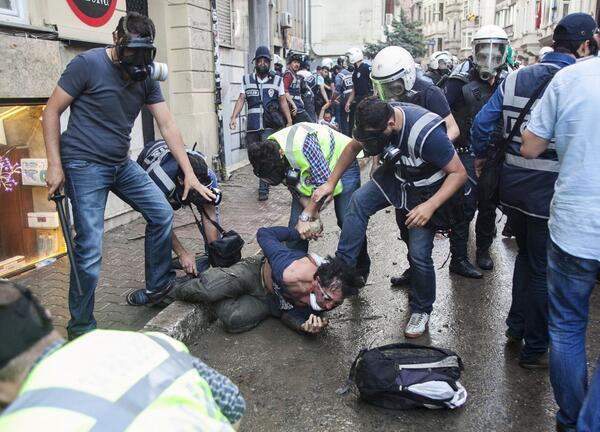
Turkey’s False Nostalgia
By EDHEM ELDEM
New York Times, June 16, 2013
ISTANBUL — THE demonstrators who have filled the streets of Istanbul and other Turkish cities for nearly three weeks complain that Prime Minister Recep Tayyip Erdogan’s Justice and Development Party, known as the A.K.P., has adopted an increasingly authoritarian attitude that threatens basic freedoms. They also resent his tendency to meddle in the personal lives of citizens — by condemning abortion or trying to control the sale and consumption of alcohol.
But Mr. Erdogan isn’t the first Turkish leader to have flirted with authoritarianism and social engineering. This is important to remember, since many of his opponents tend to hark back to a nostalgic past, best illustrated by the profusion of Turkish flags and images of the republic’s founder, Mustafa Kemal Ataturk.
Before claiming that Mr. Erdogan’s moves can be countered by returning to the foundations of the secular republic, we should recall that Turkey was not a democracy until 1950; that it was ruled consecutively from 1923 to 1946 by two unchallenged leaders, Ataturk and Ismet Inonu, each invested with dictatorial powers; and that its democracy was “interrupted” three times by military coups or interventions, in 1960, 1971 and 1980, not to mention a failed one in 1997. Moreover, Turkish “secularism” often marginalized and oppressed those who openly displayed their beliefs; head-scarf-wearing women were banned from universities, and few protections were given to religious minorities.
Turkey’s past has little to offer in terms of democratic inspiration. Ironically, there is hardly any difference between the nostalgia for Ataturk-era secularism and the A.K.P.’s glorification of the Ottoman imperial past. Both rest on the reinvention of an imagined golden age — the former with a secularist emphasis, and the latter with a focus on Islamic identity. And both look back fondly on authoritarian regimes, which makes them all the less credible as political models for a democratic present and future.
The current protest movement isn’t about the past; it is about today and tomorrow. It started because a new generation wanted to defend Gezi Park, a public green space, against the violent, abusive manner in which the government sought to sacrifice it to the gods of neo-liberalism and neo-Ottomanism with a plan to build a replica of Ottoman barracks, a shopping mall and apartments.
The real challenge for the protesters, therefore, is to ensure that this movement is not hijacked by a Kemalist backlash that seeks to reduce Turkey’s complex social problems to a simplistic dichotomy between Islam and secularism.
What Mr. Erdogan is currently undermining and destroying isn’t an imagined golden age of a secular and democratic Turkey, which never really existed, but rather the “état de grâce” that followed his party’s first electoral victory in 2002. For five or six years, the A.K.P. used democracy as its only defense against the authoritarian ways of the old guard — the coalition formed by the secular political parties and the army, long considered the guarantor of secularism.
It is disturbing that Mr. Erdogan, after years of successfully fighting the legacy of military control, has now chosen to revive precisely the same methods and strategies that characterized his predecessors’ rule. Banking on the combined power of religion and nationalism in a country whose population is known for its conservative attitudes on both counts, he is seeking to do with the help of the police what previous governments did with the help of the army.
Just as it seemed that the protesters had sealed their victory and forced the government to recognize their legitimacy, another brutal police crackdown began on Saturday evening. To make matters worse, Mr. Erdogan is now inciting and mobilizing his own supporters in a dangerous game of intimidation and escalation. Unless moderates in his own party abandon their unquestioning submission to his leadership and speak out, the situation could deteriorate further.
Turkey has come to a point where the government, setting aside timid attempts at conciliation, seems intent on waging all-out war against any opposition to its policies. A crisis that could have been managed through a democratic process has now escalated to a frightening level of polarization and violence.
A.K.P. leaders need to understand that true secular democracy is the only viable way to guarantee the rights and freedoms of all citizens, including Muslims. And Mr. Erdogan’s opponents must grasp that true secularism, contrary to its earlier Kemalist incarnation, requires that the principles of democracy be applied to all members of society. Unfortunately, the new egalitarian discourses rising from Gezi Park risk being drowned out in the clamor of an outdated political struggle.


